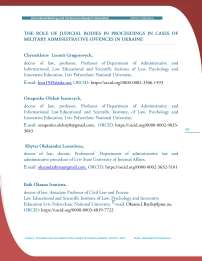The role of judicial bodies in proceedings in cases of military administrative offences in Ukraine
Автор: Grigoryevich Ch.L.
Журнал: Science, Education and Innovations in the Context of Modern Problems @imcra
Статья в выпуске: 2 vol.4, 2021 года.
Бесплатный доступ
Theoretical and legal principles and practice of judicial bodies in proceedings on military administrative offences, which is very relevant not only in Ukraine but also abroad have been analysed in the article. The mentioned above problems once again emphasize the importance of the effectiveness of justice in the special conditions of military service during the aggravation of the military situation due to illegal military formations in eastern Ukraine, which negatively affects military discipline, legality and law and order. The need to strengthen the administrative responsibility of servicemen, conscripts and reservists during training (inspection) and special gatherings in order to prevent them from committing offences, their conscious attitude to military service, ensuring high combat readiness and combat capability of military units and subdivisions has been proved. It has been noted that one of the reasons for committing military administrative offences and crimes by the military men is their insufficient legal competence. Outlining the peculiarities of proceedings in cases of military administrative offences by judicial authorities, the problematic issues in determining the qualifications of wrongful acts (inaction) committed by servicemen and persons equated to them have been indicated. Taking into consideration foreign and national legislation, proposals and recommendations of the military and law enforcement agencies, the attention was drawn to the issues of standardization of the legal framework for the administration of justice by military courts both in peacetime and in wartime.
Administrative responsibility, military administrative offence, servicemen, conscripts, military courts, qualification of the offence, judicial authorities, justice
Короткий адрес: https://sciup.org/16010089
IDR: 16010089
Текст научной статьи The role of judicial bodies in proceedings in cases of military administrative offences in Ukraine
Е-mail: , ORCID:
Е-mail: , ORCID: 68
Lviv Polytechnic National University, Е-mail: anatolii.s.kryzhanivskyi@lpnu.uaORC1D:
Science, Education and Innovations in the context of modern problems, 05 NOV, 2021 Baku, International Conference

Since 2014 until present days, the world community has been anxiously watching the escalation of the military situation in eastern Ukraine, which brings death to servicemen and civilians and sorrow to their families every day, which undermines the country's political and socio-economic development. During this period, according to court practice, the number of administrative offences and criminal encroachments among servicemen and persons equated to them also has increased greatly. This situation in the field of national defence forces the government to take urgent organizational and legal measures to prevent the offences commission among servicemen, finding out on the basis of fair justice the conditions and reasons for their commission and, if necessary, to prosecute the perpetrators.
2. Purpose and objectives of the study
The purpose of the study is to determine the role of the judiciary in dealing with cases of military administrative offences in Ukraine and to study the peculiarities of their activity.
To achieve this purpose, the following tasks have been solved:
- to investigate normative and literary data on the state of counteraction to the commission of military administrative offences;
- to analyse and determine the essence of the military administrative offence and administrative liability of servicemen and persons equated to them;
- to outline the problematic issues of judicial practice regarding the consideration of cases of military administrative offences;
- to substantiate the reasons and conditions for the military courts restoration.
3. Research of normative and literary data on the state of counteraction to committing military administrative offences
In the context of many years of hostilities because of the illegal armed groups of the so-called 70 "DPR" and "LPR", and the annexation of the Autonomous Republic of Crimea Ukraine, in compliance with international and national law, is forced to mobilize its defence efforts to combat crime and administrative offences. Henceforth, with the adoption on February 5, 2015 of the Amendment under the № 158-VIII to the Law of Ukraine "On Amendments to Certain
Legislative Acts of Ukraine Concerning Strengthening the Responsibility of Servicemen,
Granting Additional Rights to Commanders and Imposing Duties in a Special Period" [1], Code of Ukraine on the Administrative Offences (hereinafter - Code) was supplemented by Chapter 13-B "Military Administrative Offences", where Articles 172-10 - 172-20 of the Code define the composition of military administrative offences in a special period associated with the violation of the order of passage or military service. In addition, Article 15 of the Code was supplemented by Part 5, which stipulates that <…> servicemen shall be liable for military administrative offences under Chapter 13-B of this Code, provided that these offences do not entail criminal liability. [2].
Also, on March 16, 2017, the Law of Ukraine of 1952-VIII "On Amendments to Certain Legislative Acts of Ukraine Concerning Strengthening the Responsibility of Servicemen and Certain Other Persons" [3], part five of Article 15 of the Code, for the second time since 2015, was supplemented with the content stating that in addition to servicemen serving in the military troops under a contract, conscripts and reservists will also be held liable for military administrative offences during their military service. The above-mentioned changes in the legislation once again indicate the urgency of the regulations adopted by the parliament, which are aimed at improving the discipline and legality of servicemen, as well as conscripts and reservists during training (inspection) and special gatherings to prevent them from committing
Science, Education and Innovations in the context of modern problems, 05 NOV, 2021 Baku, International Conference

offences, conscious attitude to military service, ensuring high combat readiness and combat capability of military units and subdivisions.
4. Analysis and definition of the essence of military administrative offences and administrative liability of servicemen and persons equated to them
As Professor O. I. Ostapenko indicates, <…> the generalized analysis of offences committed by servicemen, shows the presence of 59 types of offences enshrined in the current legislation of Ukraine, which by object and subject of encroachment are illegal, socially dangerous and harmful, committed by servicemen and persons equated to them under the time of their military service in peacetime and in other periods of time. Of course, most articles that provide for administrative liability for military administrative offences are "non-working." At the same time, during legal measures with servicemen and persons equated to them, the explanation of the content of these articles is of preventive direction [4].
Page 71
Administrative liability for a violation of a military administrative offence is defined in the military legal dictionary as <…> a form of legal liability of a serviceman for an offence that is not related to the performance of official duties and is not criminally punishable. It also applies to conscripts during their military training. [5]
Regarding the definition of the essence of a military administrative offence, it is mostly, referring to Article 9 of the Code, defined in the order of the Ministry of Defence of Ukraine from 02.03.2021 № 54 and interpreted as <…> illegal culpable (intentional or negligent) servicemen action or inaction, which provides for administrative liability, defined by Chapter 13-B of the Code [6]. And in the previous order of the Ministry of Defence of Ukraine dated 29.11.2018 № 604 the content of a military administrative offence is defined only as <…> an offence committed by a serviceman, which entails administrative liability under Chapter 13-B of the Code [7].
5. Problematic issues of judicial practice in dealing with cases of military administrative offences
Improving the legality and discipline of servicemen, conscripts and reservists depends to some extent on their legal culture and level of the law awareness. However, insufficient legal competence is the reason for committing military administrative offences and crimes. And one of the legal guarantees of proper protection of the rights and legitimate interests of servicemen and persons equated to them, the interests of the state in the field of defence and security, as well as the application of administrative measures to combat military administrative offences is the system of courts, which, according to the Article 221 of the Code have the right to investigate cases of administrative offences in the mentioned above area.
Science, Education and Innovations in the context of modern problems, 05 NOV, 2021 Baku, International Conference

When considering cases of military administrative offences, the courts, in accordance with the task of administrative proceedings, must find out all the causes and conditions of the offence, their timely, comprehensive, complete and objective solution, with mandatory enforcement of the decision and prevention of offences, servicemen, conscripts and reservists education in the spirit of discipline and strengthening the rule of law. Judges should pay particular attention to the fact-finding phase of the case, which aims to gather evidences that confirm or deny the guilt of servicemen, conscripts and reservists.
According to the juridical practice, a significant part of the proceedings in the case of military administrative offences in connection with the insignificance of the offence and in connection with the expiration of the administrative penalty are closed for lack of administrative offence.
An example of this is the decision of Novozavodsky district court of Chernihiv city from August 16, 2017 in respect of G., which closed the proceedings in connection with the absence in the actions of the accused of an administrative offence, provided by Part 2 of the Article 172-15 of the Code, and the decision of the Novgorod-Siversky district court of the Chernihiv region from January 31, 2017 in proceedings in case concerning Sh. about commission of the administrative offence provided by Part 1 of the Article 172-18 of the Code, which was also closed due to the lack of an administrative offence [8].
Another factor influencing the strengthening of the legality and the prevention of offences is the improper preparation of materials by the Military Law Enforcement Service on the commission of an administrative offence by persons, which makes it impossible for the courts to consider these cases objectively.
An essential disadvantage in the theory of administrative proceedings in matters of military administrative offences is also the imperfect practice in determining the qualification features of these illegal actions or inactivity, committed by servicemen and persons equated to them. It is the administrative and legal qualification that precedes the judicial prosecution of servicemen, conscripts and reservists. This problem is still out of the attention of most scientists and requires careful review and research.
Clarifying the terminology of the word "qualification" (Latin gualis - quality, facere - make) in the dictionary of the Ukrainian language, it is interpreted as <…> 1) action with the meaning “to 72 qualify”; 2) the degree of suitability, readiness for any type of work; 3) speciality, profession, job [9]. Already in the legal encyclopaedia, the term "qualification" is defined as <…> characteristics of the subject, phenomenon, its assignment to a certain category, group, level of theoretical and practical knowledge in the profession or speciality [10 p. 71]. V. Kolpakov, characterizing the counteraction to organized criminal corruption, points out that <…> one of the prerequisites for the qualification of administrative torts is the factual circumstances under which the wrongful acts or omissions were committed [11].
Taking into account the information mentioned above, as the military administrative offence qualification, in our opinion, should be understood the actions of the judicial body directed to legal evaluation of the definition of objective and subjective features, that characterize the wrongful (intentional or negligent) action or inaction of servicemen, conscripts and reservists, in order to establish the presence or absence of an administrative offence and certain grounds and limits of bringing them, if necessary, to administrative responsibility. The qualification of a military administrative offence once again emphasizes the importance of the inseparable link between the judiciary and the person who committed the offence, giving them certain rights and responsibilities.
However, courts when dealing with cases of military administrative offences often encounter circumstances that require clarification of additional facts about the commission of an administrative offence by servicemen, conscripts and reservists. Such a practice, in accordance with the criminal procedure legislation, exists in the investigation of crimes, where in order to obtain factual data during the judicial investigation; the court by a reasoned decision instructs the judicial body conducting the investigation to perform certain investigative actions. In our
Science, Education and Innovations in the context of modern problems, 05 NOV, 2021 Baku, International Conference opinion, this positive practice will be fully justified in administrative proceedings when considering cases of military administrative offences, which will significantly reduce the number of cases in the courts of appeal.
Given the large number of complaints received from servicemen, conscripts and reservists related to the illegality of the actions of command staff, the organization and service, especially relevant today in administrative proceedings is the role of review of the decision in connection with newly discovered circumstances that were not taken into account before, and the fact of their establishment would influence positively on the adoption of a new fundamental decision of the court.
The newly discovered circumstances, as it has been noted by the Supreme Court of Ukraine in the case of 20 February 2020 № 815/6834/15, <…> include the substantive and legal facts, on which the claims and objections of the parties are based, as well as other facts relevant to the correct resolution of the dispute .. <…> grounds for review of the court decision on the newly discovered circumstances are, in particular, essential to the case circumstances that were not and could not be known to the applicant at the time of the case… <…> and necessary and common features of the newly discovered circumstances are:
- the existence of these circumstances during the consideration and resolution of the case and the adoption of a court decision to review the application;
- at the time of the hearing these circumstances could not objectively have been known to either the applicant or the court;
- the materiality of these circumstances for consideration of the case (i.e. when taking into account these circumstances by the court would result in a different court decision than the one Page 73that was made) [12].
6. Search and substantiation of positions of military courts restoration in Ukraine
However, according to the judicial practice, not all new circumstances can be grounds for reconsideration of cases. Yes, such circumstance can be the new circumstance which has appeared or changed after consideration of case. New circumstances discovered after the court's decision, as well as a change in the court's legal position in other similar cases, shall not be considered as newly discovered.
Circumstances established on the basis of evidence that were not submitted in time by the parties or other persons involved in the case may not be considered as newly discovered. Circumstances that arose or changed after the court's decision, as well as circumstances referred to by the participant in the trial in his explanations, cassation appeal, or which could be established if the court complied with the requirements of procedural law, also can not be considered as newly discovered [12].
Considering the issue of administrative and legal regulation of Chapter 13-B of the Code, scholars of the theory and practice of administrative law are always faced with new tasks regarding their social conditionality, which should be the main determinant in the activities of judges in making reasonable decisions in cases with the military administrative offences. The social conditionality of the life of servicemen and persons equated to them depends entirely on the conditions and circumstances of the life of the society. Thus, aspects of social conditionality of administrative and legal opposition to the norms of the Article 172-10 - 172-20 of the Code are undoubtedly related to the conditionality of administrative wrongful acts or omissions of servicemen, conscripts and reservists.
In accordance with the order of the Ministry of Defence of Ukraine dated 02.03.2021 № 54, which approved amendments to the Instruction on the submission of reports and denunciations on events, criminal offences, military administrative offences and administrative offences related to corruption, violations of military discipline and their registration in the Ministry of Defence of Ukraine, the Armed Forces of Ukraine and the State Special Transport Service (see, in particular: [6]), the governing bodies of the Military Law Enforcement Service identify persons who collect information, summarize it, and record information about events, criminal offences, military administrative offences and administrative offences. In addition, the Military Law Enforcement Service is also required to submit the materials of a military administrative offence to a court, which considers them at the place where the military administrative offence was committed.
The question of restoration of the military courts, which were liquidated in 2010, is controversial today. The activity of the institute of military courts allegedly with one of the parties is justified. Strong arguments for this are:
-
- strengthening the state's defence capabilities;
-
- ensuring proper administration of justice during military operations in Luhansk and Donetsk regions;
-
- protection of the civilian population of the temporarily occupied territories of Ukraine;
-
- ensuring prompt, objective, impartial and professional dispute resolution;
-
- strengthening discipline and law and order;
-
- educating servicemen to respect the law and order, etc.
In this regard, Myroslav Peremoha quite logically proves his rightness, claiming that <…> there is no higher state interest or even common sense behind the liquidation of military courts. They were cut of their duties because of their independence from the top state and judicial authorities, as well as due to the relative secrecy of their activity, as it was associated with the traditionally closed part of society such as the army [13].
In support of the above, the Chairman of the Verkhovna Rada Committee of Ukraine on National Security, Defence and Intelligence Oleksandr Zavitnevych adds to the indicated reasons that <…> the current system of pre-trial investigation does not provide effective and prompt investigation of war crimes, which negatively influences the combat readiness of military units and subdivisions of the Armed Forces of Ukraine and other military formations [14].
These reasons were the reason in 2014 for the resumption of military prosecutors. As noted by A. Matios <…>, the total number of proceedings committed by more than 43,000 servicemen and conducted by investigators of the military prosecutor's office during 2015-2018 exceeded 20,000 cases. The most common among them were unauthorized leaving of a military unit or place of service, and desertion [15].
However, despite the fact that draft laws were submitted to the Verkhovna Rada of Ukraine for three times, № 1896, dated 30.01.2015 [16], № 2557, dated 06.04.2015 [17], and № 8392, dated 22.05.2018 [18], all of them were rejected on an indefinite term.
Taking into account Article 6 of the Convention for the Protection of Human Rights and Fundamental Freedoms which states that <…> everyone is entitled to a fair and public hearing
Science, Education and Innovations in the context of modern problems, 05 NOV, 2021 Baku, International Conference within a reasonable time by an independent and impartial tribunal established by law [19], and the case law of the European Court of Human Rights, it should be noted that the opinion of European lawyers concerning the military courts still remains steadfast. It goes down to the single assertion that <…> participation in the administration of justice by a military judge, who is on military service and holds the rank of an officer, as a member of the judicial board, in spite the certain guarantees of his independence, justifiably raises doubts in his independence and impartiality, what can be considered as a violation of the Article 6 §1 of the Convention on Human Rights and Fundamental Freedoms. [20]; <…> such proceedings do not comply with the democratic principles of justice; the jurisdiction of this court violates a person's rights to "his" judge; cases considered by military courts do not have any features, etc. (see, in particular: [21]).
In the search for a concept to substantiate the positions of the restoration of military courts, there is an urgent need today in a balanced professional consideration of the proposals and recommendations of the military and law enforcement. It should be mentioned that the prospects for the establishment of military courts in the national judicial system are confirmed in foreign jurisprudence. Military courts operate in many countries around the world, regardless of whether that country is involved in military conflicts or not.
One of the ways, in our opinion, to solve this important for society in Ukraine issue is to regulate the legal framework, namely: amendments to Article 126 of the Constitution of Ukraine (in 2016 it was forbidden to create emergency and special courts) to administer justice by military courts as in peacetime, with their assignment to the system of courts of general jurisdiction, and in the war period with the granting of powers to consider criminal and administrative cases of offences by servicemen and persons equated to them.
7. Conclusions
Page 75
With the increase in hostilities in eastern Ukraine, which has been going on since 2014, there is an urgent need to strengthen defence capabilities and strengthen national security, law and order, military discipline of servicemen, conscripts and reservists. This need is dictated by the time and state of military offences, the number of which is increasing year by year. Therefore, the exact fact of involvement of the serviceman in administrative-jurisdictional process provides in necessary cases a possibility of application to it of the measures of administrative penalty provided by the law on the basis of the court decision. However, a serviceman must be clearly aware that the administrative proceedings initiated against him presuppose the existence of the right to defence. In our opinion, one of the additional guarantees of the right to defence for servicemen is the legislative consolidation of postponing the initiation of an administrative offence case to an earlier period, which will create additional guarantees in judicial protection of the rights of servicemen and persons suspected of committing military administrative offence.
Measures to strengthen military discipline and combat military administrative offences among servicemen and conscripts and reservists should be aimed at:
- regulation of social tensions among military units because of the conflicts’ emergence on the basis of terms of service and conditions of its passage;
Science, Education and Innovations in the context of modern problems, 05 NOV, 2021 Baku, International Conference

-
- raising the level of legal culture as one of the most important elements of the mechanism of general culture in order for servicemen to acquire legal knowledge in compliance with military discipline and to prevent the commission of offences;
-
- eradication of "hazing", which still remains in military relations and is one of the causes and preconditions for the creation of existing physical violence against subordinates, suicide attempts and offences;
-
- in order to identify problems and miscalculations that negatively affect the state of military discipline and the commission of offences to constantly improve the level and quality of problem-based work among servicemen and persons equated to them, applying problem-based measures to influence them and resolve identified social contradictions.
One of the reasons for the troubles in the judicial practice regarding the proceedings in cases of military administrative offences are:
-
- non-compliance of protocols with the requirements of Article 254, and 256 of the Code and departmental normative and legal regulations on the preparation of materials on administrative offences, which is a consequence of the return of materials for revision;
-
- non-appearance at the court hearing of servicemen and persons equated to them, who were not properly notified of the time and place of the hearing, forcing the judicial authorities to re-send court summonses for their arrival for the court;
-
- superficial examination of evidence related to the interrogation of witnesses in court, examination and evaluation of other evidence, which leads to an early court decision;
-
- inattention and simplified approach to the study of cases, as well as to their consideration on the merits and court decision.


